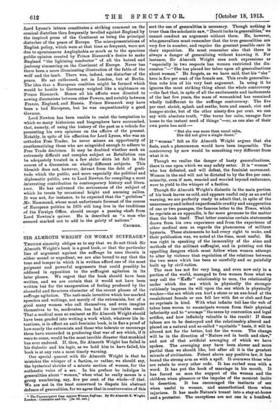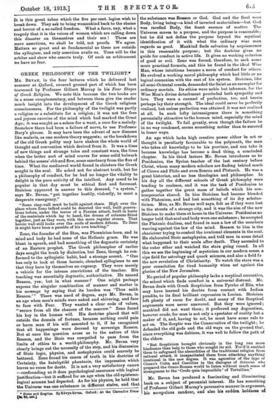ALMROTFI WRIGHT ON WOMAN SUFFRAGE.* THorroa sincerity obliges us to
say that we do not think Sir Almroth Wright's book is a good book, or that the particular line of argument against the suffrage he uses therein is either sound or expedient, we are also bound to say that the tone and temper in which it is written afford one of the most poignant and powerful arguments that could possibly be adduced in opposition to the suffragist agitation in its later phases. We regret that the book should have been written, and we are certain that it would not have been written but for the exasperation of feeling produced by the shameful and ferocious character of the recent phases of the suffrage agitation. The anti-male invective which has marked speeches and writings, not merely of the extremists, but of a good many women who call themselves, and even imagine themselves to be, moderates, has had its inevitable result. That a medical man so eminent as Sir Almroth Wright should have been goaded into writing a work which, whatever his in- ientions, is in effect an anti-feminine book, is in fine a proof of Low nearly the extremists and those who tolerate or encourage them have succeeded in producing that war of sex which, if it were to come, would be the most terrible disaster that mankind bas ever endured. If, then, Sir Almroth Wright has failed in his dialectic and his logic, as we hold him to have failed, his look is at any rate a most timely warning.
Our special quarrel with Sir Almroth Wright is that he mistakes the whisper of a faction, or rather, we should say, the hysterical shrieks of a minute section of women, for the authentic voice of a sex. In his preface he indulges in generalities about "woman," when what he really means is a group numbering, say, five per cent, of the whole—if that. We are not in the least concerned to dispute his abstract defence of generalities, for we agree that in controversies of this
• • The Unerpurgated Case against WO1Rall Suffrage. By Sir Altnroth E. Wright. London: Constable and Co. [2s. 6d. net.] sort the use of generalities is necessary. Though nothing is truer than the scholastic saw, "Deceit larks in generalities," we cannot conduct an argument without them. He, however, who generalizes must remember that the true generalities are very few in number, and require the greatest possible care in their exposition. He must remember also that there is always a danger of generalizing without knowing it. For instance, Sir Almroth Wright uses such expressions as "especially in two respects has woman restricted the dis- cussion "—" She has placed her taboo upon all generalisations about women." He forgets, as we have said, that his " she " here is five per cent. of the female sex. This crude generalisa- tion robs him of his very best argument. In using it he ignores the most striking thing about the whole controversy —the fact that, in spite of all the excitements and incitements of the last few years, the mass of womankind has remained wholly indifferent to the suffrage controversy. The five per cent, shriek, splash and seethe, burn and smash, riot and hunger-strike, but of the other ninety-five per cent. we can say with absolute truth, "She turns her calm, uneager face home to the instant need of things "—or, as one also of their own poets has said :— " But she was more than usual calm, She did not give a single damn."
If "woman" felt as Sir Almroth Wright argues that she feels, such a phenomenon would have been impossible. The controversy by now would be something very different from what it is.
Though we realize the danger of hasty generalisations, there is one upon which we may safely enter. It is " woman " who has defeated, and will defeat, the feminist movement. Woman in the end will not be dictated to by the five per cent, minority, even if men, wearied and worried beyond endurance, were to yield to the whisper of a faction.
Though Sir Almroth Wright's dialectic in the main portion of his book leaves us cold, and appears useful only as an awful warning, we are perfectly ready to admit that, in spite of the unnecessary and indeed unpardonable crudity and exaggeration of one or two passages, the famous letter to the Times, which he reprints as an appendix, is far more germane to the matter than the book itself. That letter contains certain statements drawn from his own experience and from the experience of other medical men as regards the phenomena of militant hysteria. These statements he had every right to make, and their publication was, we noted at the time, most useful. He was right in speaking of the immorality of the aims and methods of the militant suffragist, and in pointing out the appalling dangers which must follow when women attempt to alter by violence that regulation of the relations between the two sexes which has been so carefully and so painfully built up by civil zation.
The race has not for very long, and even now only in a portion of the world, managed to free women from what we may call the "Kaffir" relationship to men, the relationship under which the sex which is physically the stronger ruthlessly imposes its will upon the sex which is physically weaker—the sex which can hurl a stone or an axe-head at the recalcitrant female or can fell her with fist or club and fear no reprisals in kind. With what infinite toil has the web of taboo been woven to emancipate women from their physical inferiority and to "average" the sexes by convention and legal artifice, and bow infinitely valuable is the result! If these taboos are to be destroyed and the relationship altered and placed on a natural and so-called " equitable " basis, it will be altered not for the better, but for the worse. The change will be in the direction of "Nature red in tooth and claw,"
and not of that artificial averaging of which we have spoken. The averaging may have been slower and more partial than we should like, but after all it is the greatest miracle of civilisation. Potent above any positive law, it has bound the strong arm as with a spell. It overawes those who
are rebels to every other code. It has curbed man with a word. It has put the hook of marriage in his mouth. It has forced on man the support of the woman and the children when pleasure or the impulse of the moment incite
to desertion. It has encouraged the instincts of sex when useful to woman, and anaesthetized them when
injurious. It has made Nature's truant into a stay-at-home and a protector. The exceptions are not one in a hundred.
It is this great taboo which the five per cent, legion wish to break down. They ask to bring womankind back to the shame and horror of a so-called freedom. What a farce, nay, what a tragedy that it is the voices of women which are calling down this disaster on themselves and their sex ! These are mere assertions, we shall be told, not proofs. We agree. Matters so great and so fundamental as these are outside the syllogism, and only assertion avails us. Time will be the arbiter and show who asserts truly. Of such an arbitrament we have no fear.















































 Previous page
Previous page